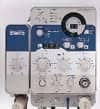09/07/06
Mayo Clinic researchers have found that an asthma diagnostic test, the exhaled nitric oxide test, is an inexpensive, quick, and easy way to determine whether inhaled corticosteroids will relieve a patient’s chronic cough. Details were presented in an abstract at the European Respiratory Society Meeting in Munich, Germany, Sept. 6.
“We’re thinking this could be a significant development in the field of chronic cough,” says Peter Hahn, MD, Mayo Clinic pulmonologist and lead study investigator. “It could drastically change what we do for patients with chronic cough and also the guidelines for diagnosis and treatment of chronic cough. This very accurate—but rather underused—test could be used up front for all patients complaining of chronic cough, saving significant time and expense in other testing. It helps us get to the treatment and bring relief to the patient in the least invasive, fastest way possible.”
An estimated 23 million Americans see their physicians each year for cough; it is the third most common reason a patient seeks a physician visit, according to the Mayo Clinic researchers. Chronic cough is variably defined as 3 to 8 weeks of prolonged cough. Most patients see a physician because the cough disrupts their daily lives, says Hahn. The three major diagnoses that can cause chronic cough are: upper airway cough syndrome (also known as postnasal drip syndrome), asthma, and gastroesophageal reflux. Another diagnosis that affects fewer chronic coughers is nonasthmatic eosinophilic bronchitis.
The exhaled nitric oxide test measures inflammation in the lungs’ bronchial tubes. The patient breathes into an analyzer four or five times over the course of 10 minutes. Abnormal scores indicate that the patient has asthma or possibly nonasthmatic eosinophilic bronchitis. Both can be effectively treated with inhaled corticosteroids. In these patients, inflammation irritates the airway and prompts coughing. Corticosteroids help reduce the inflammation, alleviating the cough.








